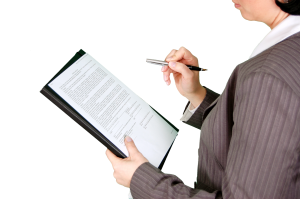If you’ve ever had any dealings with the tax man, or even if you just run a business of any kind, you will be very familiar with the reams of forms you are asked to fill in every year, especially around April. Among these forms is the P11D, the mandatory form required by HMRC from most UK based employers. This particular form is for employers to detail the cash equivalents of any benefits and expenses they’ve paid out that year. Sounds simple, yes? But you’d be amazed at the amount of people who struggle with this form every year – or who don’t file it when they should and get into trouble. So today, we’re going to give you the breakdown of who needs to file a P11D, and why.
Who Needs To File?
Before you start to panic – a P11D doesn’t have to be filled in for every single person in your business. The administration of that paperwork alone would be enough to keep a team busy for months! No. Instead, you only need to fill in P11D’s for your directors, and any employee who is earning more than £8,500 a year. Now, for a small business with just 1 director or a small number of employees, this makes the process much more manageable. Even better, P11D’s can be submitted in hard copy or electronically, which makes it much easier for busy business owners to complete and file on time.
What Needs To Be Included?
There are currently 14 sections on the P11D, and each one needs to be filed in for each employee. These sections are:
 Section A – Assets Transferred
Section A – Assets Transferred
Section B – Payments Made On Behalf Of The Employee
Section C – Credit Cards And Vouchers
Section D – Living Accommodation
Section E – Milage Allowances
Section F – Car And Car Fuel
Section G – Company Vans
Section H – Beneficial Loans
Section I – Medical Health
Section J – Qualifying Relocation Payments
Section K – Services Supplied
Section L – Assets Placed At Employee’s Disposal
Section M – Other Items
Section N – Expenses Payments
Other: Any benefits that attract Class 1A National Insurance contributions should also be reported, using the brown boxes on the form.
While this might sound intimidating, smaller businesses will notice that some of these sections aren’t applicable to them – like medical health or relocation payments for example. A big part of filling in this form correctly is understanding exactly what each section means, so you know you’re putting the right numbers in the right places. If you’re feeling a bit stumped by that, just have a chat with an accountant who deals with small businesses, like us, who will be able to help you make sense of it.
Why Do I Need To File This?
 We could make this section really short for you and just say ‘because it’s the law’, but that wouldn’t really be fair. After all, you want to understand why you have to fill in all of this paperwork every year, and not just be fobbed off with ‘because I said so’. By the word of HMRC, you need to file a P11D only if you reimburse expenses or may any benefits to your employees or directors. HMRC are on the warpath, trying to find businesses who are overpaying employees through expenses and benefits or trying to evade tax due. So to avoid the wrath of the tax man and some pretty hefty fines, you need to make sure you are operating above board and reporting everything that qualifies against their rules, or have an appropriate exemption certificate in place (we’ll talk about that in a second). If you don’t, just know that in extreme HMRC have been known to prosecute business owners for failure to file P11D’s.
We could make this section really short for you and just say ‘because it’s the law’, but that wouldn’t really be fair. After all, you want to understand why you have to fill in all of this paperwork every year, and not just be fobbed off with ‘because I said so’. By the word of HMRC, you need to file a P11D only if you reimburse expenses or may any benefits to your employees or directors. HMRC are on the warpath, trying to find businesses who are overpaying employees through expenses and benefits or trying to evade tax due. So to avoid the wrath of the tax man and some pretty hefty fines, you need to make sure you are operating above board and reporting everything that qualifies against their rules, or have an appropriate exemption certificate in place (we’ll talk about that in a second). If you don’t, just know that in extreme HMRC have been known to prosecute business owners for failure to file P11D’s.
Are There Any Exceptions?
To make matters a bit more confusing (because that’s what HMRC do best), you can apply for an exemption. To qualify for an exemption from P11D, you need to either:
- Be paying a flat rate to your employees as part of their earnings (either a benchmark or a ‘special’ rate approved by HMRC)
- Paying back the employee’s actual costs
If you’re in the first camp, you don’t need to apply for an exemption, it’s already covered. But if you’re in camp 2, you will need to apply for an exemption, which you can do here. This exemption (either applied for or assumed) means you don’t need to report certain business expenses and benefits, like business travel, phone bills or uniform and tools for work.
Are you confused yet? Frankly, HMRC are changing or adjusting the reporting requirements so often, it can be tough to keep up with it all, especially if you don’t know whether you have to report or not. To make sense of your P11D benefits form, or to find out if your business need to report, get in touch with the experts at Cove Accountancy Services to arrange your free consultation.
